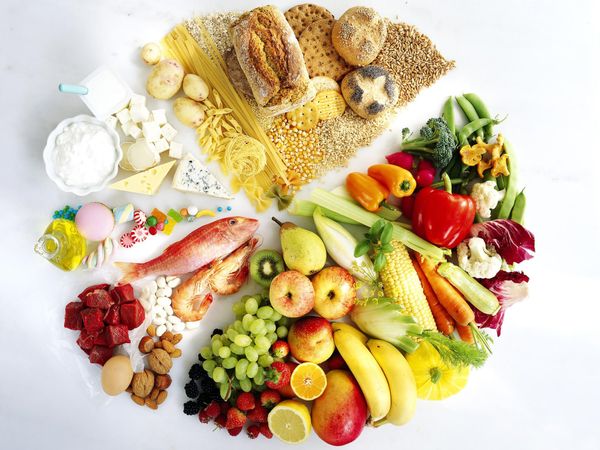Some grocery items can last forever if they’re stored properly. Follow these tricks to stop wasting food—and money.
Frozen herbs: One year

“Herbs can go off very quickly, so prior to that happening, chop them up finely, put them in an ice cube tray, and add either water or olive oil,” advises Nikki Sharp, author of Meal Prep Your Way to Weight Loss and host of the podcast #Adulting. “Then, when you’re ready to use the herb, pop it out and you can heat the olive oil up in a pan while sautéing your cilantro, for example. Alternatively, add mint and water then throw into smoothies.” This method allows herbs to last for up to a year, Sharp says.
Frozen fruit: One year

Fresh fruit is great, but frozen fruit will give you more bang for your buck if you’re looking for longevity. “Fruits can add flavor to any dish, or you can use them to whip up smoothies that can act as a meal or snack,” says Beth Warren, author of Secrets of a Kosher Girl. “Frozen fruit lasts about one year in the freezer.”
Frozen vegetables: 18 months

“Frozen vegetables are just as nutritious as fresh ones, and sometimes even more so because they are stored straight from harvest,” Warren explains. “Nutrients like vitamin C are lost over time, so frozen vegetables like string beans are more likely to have more than fresh. They are an easy solution to getting veggies on your plate when on a budget or in a time crunch, and they last for about 18 months in the freezer.”
Nut butters: Two years

Whether you prefer peanut, almond, cashew, or another type of nut butter, the good news is that you can definitely stock up on it and save it for later. If unopened, a jar of nut butter lasts for two years, according to savethefood.com. But heads up: Once opened, commercial nut butters last up to six months, and natural ones stay good for just three months.
Pickled vegetables: Two years

“Pickling is a process that was created specifically to preserve vegetables for long periods of time,” says Neda Varbanova of healthywithnedi.com. “Pickles can last up to two years unopened in the pantry.” And even after they’re opened, they still last a pretty long time: up to a year in the fridge. Note that not all foods are fridge-friendly.
Nuts: Two years

As long as they’re sealed properly, nuts can last up to two years in the freezer, says registered dietitian nutritionist Sharon Palmer. Almonds are particularly durable. “The hard structure of the nut can help maintain freshness, and almonds are a bit lower in fat and higher in vitamin E, which means lower risk of rancidity,” Palmer says.
Canned beans: Two or more years

“I love to store canned legumes because they are so versatile,” Warren says. “You can eat them alone or add them to another dish for added bulk and flavor. Canned legumes begin to lose their moisture after one to two years.” After that, you might have to cook them longer, but they’re still good, she says.
Canned fish: Three years

That canned tuna is always a safe buy, according to savethefood.com, because it lasts for three years when stored in a cool, dry place. Once opened, the contents can be refrigerated for three to four days and frozen for up to two months.
Balsamic vinegar: Four years

“Vinegar can last in the pantry for up to three to four years for the best quality,” says Abbey Sharp, a registered dietitian and founder of abbeyskitchen.com. “Store it in a tightly sealed container, in a cool dark place away from heat or sunlight.” Once opened, you should try to use vinegar within two years for the best taste—but it safe to use indefinitely.
Maple syrup: Indefinitely

Stored at room temperature, maple syrup will go bad in two years, but if you store it in the freezer, it can last forever, according to savethefood.com. Interestingly, pure maple syrup doesn’t actually freeze, which makes the freezer a great place to store it (in an airtight container, of course).
Dry lentils and beans: Indefinitely

“These can last indefinitely, but after one year they may need slightly longer cooking times,” says Jennifer Kaplan, an author and an instructor at the Culinary Institute of America. “Store them in an airtight glass container in a cool, dark, dry place. Do not wash until just before use.” Be careful where you stash your foods.
Brown sugar: Indefinitely

“Brown sugar can last indefinitely, but will likely need to be softened,” Kaplan says. But don’t leave the open bag in your pantry and expect the quality to remain the same. Kaplan recommends moving it to an airtight glass jar, then stowing that somewhere cool, dark, and dry. White sugar can last indefinitely when stored that way too.
Salt: Indefinitely

“Salt is one of the world’s oldest flavorings, has a plethora of other uses, and it lasts indefinitely,” says Caleb Backe, health and wellness expert for Maple Holistics. “Place salt in a sealed container or ziplock bag, and keep it in a cool dry area. Unless dirt or bugs manage to get it, you are good to go.”
Rice: Indefinitely

“A staple of mankind, rice is eaten by more than half of the earth’s population, and many of whom depend on it for daily sustenance,” Backe says. “Get the uncooked rice into a container, or place the original bag in a freezer bag, and store in a cool, dry location. When stored properly, it can last indefinitely.”
Honey: Indefinitely

“Honey is an amazing food that never goes bad,” Varbonova says. “Scientists actually found honey inside of an Egyptian tomb that was 3,000 years old and still edible. Some companies put an expiration date on the package, and it can become crystallized, but it will actually keep on the shelf forever.”
By Julia Malacoff
Source: www.rd.com







Leave A Comment
You must be logged in to post a comment.